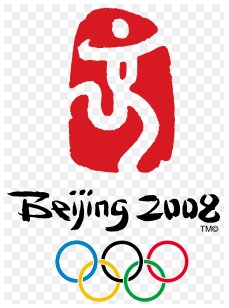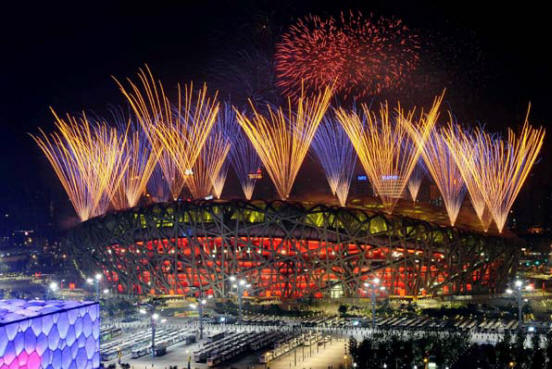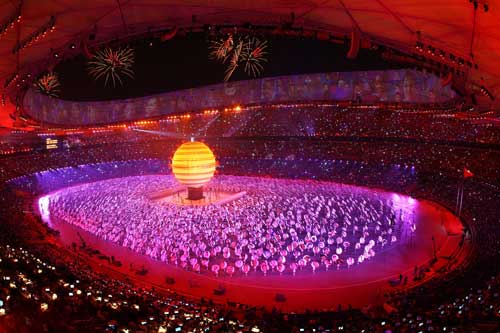In the summer of 2008, from 8 to 24 August 2008, the Summer Olympics, officially known as the Games of the XXIX Olympiad, took place in Beijing China. A total of 11,028 athletes from 204 countries competed in 28 sports and 302 other events. China became the 18th nation to hold Summer Olympic Games and the 22nd nation to host the Olympic Games and it was the third time that the Summer Olympic Games were held in Asia, after Tokyo, Japan (1964) and Seoul, South Korea (1988).
On 13 July 2001 Beijing was awarded the Games over four competitors by the International Olympic Committee (IOC) after two rounds of voting. The Government of the People's Republic of China promoted the Games and invested heavily in new facilities and transportation systems. A total of 37 venues were used to host the events including 12 constructed for use at the Games. The official logo of these Olympic Games, titled "Dancing Beijing", featured a stylised calligraphic character jīng (京, meaning capital), referring to the host city. Media outlets reported unprecedented audience interest in the Games, and these Olympics had the largest television audience in Olympic history. Some politicians and non-governmental organizations criticized the choice of China as Olympic host because of the country's human rights record.
The Chinese reported that the total spending on the games was "generally as much as that of the Athens 2004 Olympic Games", which was about $15 billion. However, other estimates bring the cost of the Beijing Olympics to approximately $40 billion, which would make it the most expensive Olympic Games ever.
The grand opening ceremony officially began nn the Beijing National Stadium, at 8:00 pm on August 8, 2008 since the number 8, in Chinese culture is associated with prosperity and confidence. The ceremony that featured a cast of over 15,000 performers and lasted over four hours, was reported to have cost over US$100 million to produce. A rich assembly of ancient Chinese art and culture dominated the ceremony. It opened with the beating of drums for the countdown. Subsequently, a giant scroll was unveiled and became the show's centerpiece. The last recipient in the Olympic Torch relay, former Chinese gymnast Li Ning was suspended into the air by wires, completed a lap of the National Stadium at Stadium roof height in the air and then ignited the cauldron.
The program for the 2008 Beijing Games included 28 sports and 302 events. Nine new events were held, including two from the new cycling discipline of BMX. Women competed in the 3000 metre steeplechase for the first time. Open water swimming events for men and women, over the distance of 10 kilometres (6.2 miles), were added to the swimming sports. Two sports were open only to men, baseball and boxing, while one sport and one discipline were open only to women, softball and synchronized swimming. Equestrian and Mixed Badminton are the only sport in which men and women compete together.
There were 43 new world records and 132 new Olympic records set at the 2008 Summer Olympics. The women’s 800m record had been held by Janet Evans (USA) for almost 20 years. But in Beijing, Great Britain’s Rebecca Adlington smashed this record, which had been set in 1989 when she was only six months old. In 2008, in the 800m final, Rebecca Adlington improved on the previous time by more than two seconds, with a new time of 8:14.10. She took the gold medal in the 800m and in the 400m, and became the first British gold medallist in women’s swimming since 1960. In Beijing, almost 50 years separated the oldest from the youngest athlete: Japanese horse rider Hiroshi Hoketsu took part in his third Olympic Games at the age of 67, whilst Cameroon swimmer, Antoinette Joyce Guedia Mouafo participated in the Games for the first time at the tender age of 12. With his ninth participation in the Games and at the age of 61, Canada’s Ian Millar won his first medal in the team jumping event. At 33, and with her fifth participation in the Games, Germany’s Oxsana Chusovitina won the silver medal in artistic gymnastics, while US swimmer Dara Torres took three silver medals at the age of 41.
An unprecedented 86 countries won at least one medal during the Games. Chinese athletes won the most gold medals, with 51, and 100 medals altogether, while the United States had the most medals total with 110. Michael Phelps broke the records for most gold medals in one Olympics and for most career gold medals for an Olympian by winning eight swimming events. Usain Bolt secured the traditional title of "World's Fastest Man" by setting new world records in the 100 m and 200 m sprints.



